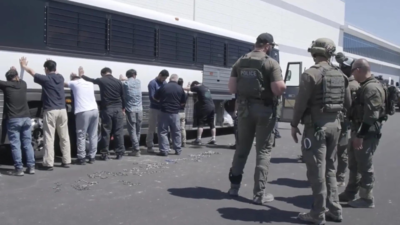More than 300 South Korean workers were among 475 people detained in a sweeping immigration raid at a Hyundai-LG battery plant under construction in Georgia, in what US officials called the “largest single-site enforcement operation” in two decades. The raid, carried out last week by hundreds of federal agents, has stirred diplomatic unease between Seoul and Washington. Seoul on Sunday agreed on a deal with Washington securing the release of the workers.
Footage released by US Immigration and Customs Enforcement (ICE) showed workers in handcuffs and shackles being escorted onto buses after the raid in Ellabell, near Savannah. The plant, jointly operated by Hyundai Motor and LG Energy Solution, is part of a multibillion-dollar push into electric vehicle manufacturing, described by state leaders as Georgia’s largest economic development project.
Inside ‘Operation Low Voltage’
The federal raid at Hyundai’s $4.3 billion joint EV battery project in Georgia, code-named “Operation Low Voltage,” was the result of months of planning by multiple agencies, as reported by news agency Reuters. More than 400 officers from ICE, Homeland Security Investigations, the FBI, DEA, the Department of Labor’s Inspector General, the IRS, and Georgia state authorities participated in what officials described as the largest single-site enforcement action in Homeland Security Investigations’ history. “This was not an immigration operation where agents went into the premises, rounded up folks and put them on buses,” Special Agent in Charge Ronnie Schrank said. “This has been a multi-month criminal investigation where we have developed evidence, conducted interviews, gathered documents and presented that evidence to the court.” Federal officials said the search warrant targeted records linked to “unlawful employment practices and other serious federal crimes.”Video from the site showed agents in vests marked HSI telling workers: “We have a search warrant for the whole site. We need construction to cease immediately.” Some workers attempted to flee, with the Justice Department confirming that several had to be pulled from a sewage pond.
Visa rules at the centre of crackdown
Reports in the Donga Ilbo said most of the detained South Koreans had entered the US under the Electronic System for Travel Authorization (ESTA) or on B-1 visas, neither of which permit manual labour. ESTA allows visa-free travel of up to 90 days for tourism or business meetings, while B-1 visas are intended for short-term business activity such as contract negotiations. Under US law, those on such permits cannot perform construction or factory work.The Trump administration has tightened scrutiny on overstays and short-term work arrangements under ESTA, and immigration officials have been reviewing entry and exit records of foreigners with repeat short-term visits. ICE agent Steven Schrank insisted those arrested were “illegally present in the United States” and “working unlawfully.”The Korea Times reported that Korean companies, facing a shortage of skilled US labour and restricted access to work visas, have often resorted to sending staff on business permits. Only 85,000 H-1B specialty visas are issued globally each year, selected by lottery, while countries such as Canada and Australia enjoy special quotas. Korean businesses had unsuccessfully lobbied Washington for a dedicated allotment of 15,000 E-4 visas for skilled workers.Industry officials told the paper the process was unworkable. “It is unreasonable to ask companies to wait months for their employees to receive H-1B visas if there is an urgent need,” one Korean executive said.
Economic stakes and political fallout
The sudden regulatory crackdown has completely halted construction at the HL-GA factory, casting doubt on the project’s timeline. Originally scheduled to begin operations next year, the launch is now expected to face delays, according to industry observers, cited by Donga Ilbo. The facility is a $7.59 billion (approximately 10.5 trillion won) joint venture established in 2023 between Hyundai Motor and LG Energy Solution, with each company holding a 50% stake.The operation has already had economic ripples. Hyundai Motor shares fell 0.7% and LG Energy Solutions dropped 2.3% after the raid, which forced a pause in construction.The raid comes amid a $350 billion Korean investment pledge in the US, announced during President Lee Jae Myung’s meeting with Donald Trump in July. Korean conglomerates have sunk billions into US factories to avoid tariffs and secure subsidies, but repeated crackdowns risk chilling further expansion.LG Energy Solution confirmed that 47 of its own staff were detained, while most of the others worked for contractors. Chief human resources officer Kim Ki-soo, speaking before flying to Georgia, said: “The top priority at this moment is the immediate release of detainees.”Hyundai insisted that none of its direct employees were among those arrested, adding it had “zero tolerance” for non-compliance with the law. Trump defended the raid, saying: “I would say that they were illegal aliens, and ICE was just doing its job.” Go to Source




